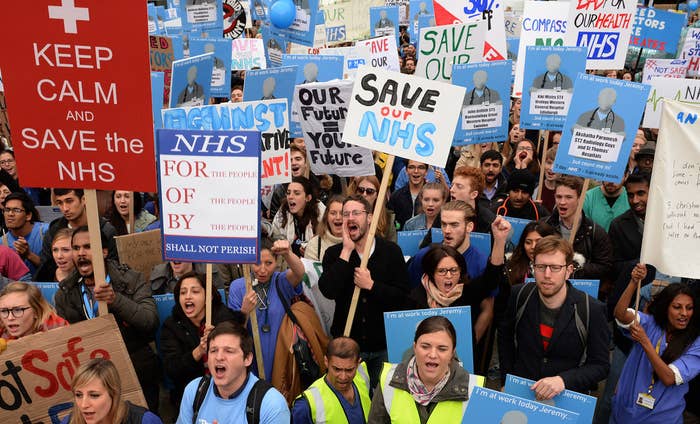The leader of Britain's junior doctors, who has played a key role in talks to avert industrial action, has said a strike is now "inevitable" as a result of "blatant lies being put out by the government".

Junior doctors will perform emergency care only for 24 hours from 8am on Tuesday in the first of several days of industrial action over the next two months.
In a Facebook post advising junior doctors on how to take part in the first action, Dr Johann Malawana said the government had "massively misrepresented their and our position" on the outcome of negotiations that ended without agreement on Monday.
"In order for action to now be stopped the government would need to explicitly come out and state that they will be directly addressing the concerns on this contract," Malawana said.
Following Monday's announcement that the industrial action, originally planned for last December, would be back on in January and February, health secretary Jeremy Hunt wrote to British Medical Association (BMA) chair Dr Mark Porter to urge doctors to once again suspend strikes and return to talks.
Hunt said 15 out of 16 contract issues put forward by the BMA had been resolved and that he was disappointed at the decision to go ahead with industrial action.
"We remain willing to show flexibility and negotiate in good faith," Hunt added.
.@Jeremy_Hunt : We've made good progress in talks so it's extremely disappointing BMA is taking industrial action
But Malawana wrote that simply offering talks was insufficient, and said "we need explicit promises in writing from the government on the key areas we have been so concerned about throughout this process".
He said weekend work, thought to be the key 16th point that remained entirely unresolved by talks, as well as the boundaries of "sociable working hours" at which doctors were being paid a standard rate, were of primary concern.
Malawana said the BMA is seeking "absolute explicit guarantees that Saturday is not a normal working day", adding that "the extensive safety aspects of this contract" are "fundamentally flawed".
Throughout the dispute over junior doctors contracts, which flared up in July when Hunt made calls to work towards a "seven-day NHS" – something doctors are adamant already exists – doctors have expressed concern that lack of safeguards over pay and working hours in the new contract would inevitably have a knock-on effect on patient safety as a result of trusts being able to overwork doctors without penalty.
In a letter to Hunt following the close of negotiations on Monday, the chief executive of NHS Employers, Danny Mortimer, outlined agreements over safe working hours that he said "appeared to be broadly supported by the BMA".
These included appointing an independent "guardian" role accountable to hospital trusts to ensure safe working hours, "robust scheduling" of doctors' working hours with the ability to report exceptions, and capping the number of consecutive night shifts a doctor can work at four.
Mortimer said financial penalties for working doctors more than 72 hours in a week, paid to trusts, could be introduced, but said "the BMA seemed unwilling or unable to discuss this major development with us".
However, Malawana said "the BMA are always willing to listen and talk to the government" but that "junior doctors simply have lost all trust in this government".
He said it had become clear with "the blatant misrepresentation of those talks" that "junior doctors need to see public and explicit guarantees from [Hunt] if industrial action on Tuesday is to be averted.
"Anything less than signed guarantees is simply not acceptable now."
Throughout negotiations, the BMA and junior doctors, who have said it is with "heavy hearts" that they would choose to strike, have echoed the Department of Health's repeated line that "talks are always better than strikes".
But, Malawana said, "the government has proven time and again it simply is unwilling to engage constructively with junior doctors, treating us with such contempt".
He added: "There is no question of us not taking action on Tuesday."
